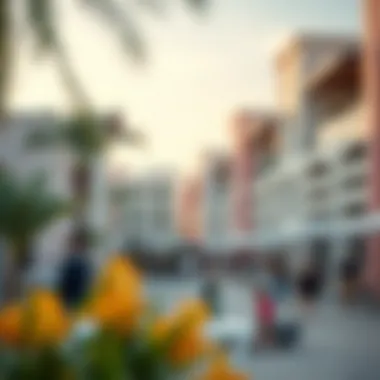Navigating Dubai's Evolving Real Estate Landscape


Intro
Navigating through the towering skyscrapers and luxurious villas, Dubai’s real estate market offers a unique blend of opportunities and challenges. For those eyeing the dynamic property landscape, understanding the various influx and outflux of market trends is paramount. Real estate in Dubai isn’t just about buying or selling; it’s an intricate dance of economic indicators, cultural shifts, and regulatory frameworks. Whether you are a seasoned investor or a newcomer, knowing the lay of the land is crucial.
Dubai has established itself as a global hub, not only for tourism and business but also as a hotspot for real estate investment. The ongoing evolution of this market isn’t a mere coincidence; instead, it's driven by a multitude of factors, from government policies to international buyer appetite.
This article seeks to illuminate the specifics of Dubai's real estate market, shining a light on current trends, investment opportunities, and invaluable insights for buyers, investors, real estate agents, and expatriates alike. Let's delve into these facets and uncover what makes this market tick.
Market Trends
Understanding the fluctuations in property prices and future forecasts is like reading the pulse of the city.
Current Property Prices
As of recent reports, property prices in Dubai have shown a fascinating trend of recovery post-pandemic. The average cost per square foot in prime areas like Downtown Dubai and Dubai Marina has remained resilient, hovering around AED 1,800 to AED 2,400 respectively. This moderation in price is a reflection of steady demand, driven largely by expatriates looking for quality housing amidst growing job opportunities.
Factors such as new developments and infrastructure projects, like the expansion of the metro and the upcoming Expo 2023, have fueled buyer interest. For instance, the community of Dubai Hills Estate has seen prices ranging between AED 1,500 and AED 2,200 per square foot, appealing to families due to its expansive parks and schools.
Future Projections
Looking ahead, the predictions for Dubai's real estate sector appear promising. Analysts speculate a continued upward trajectory, particularly in high-demand areas. Factors contributing to this sentiment include government initiatives aimed at encouraging foreign investment, such as the long-term visa scheme, which has already started to attract a wave of affluent investors.
Moreover, the forecast suggests a stabilization in rental yields, likely averaging between 5% and 7%, making it an attractive proposition for investors.
Investment Opportunities
Investing in real estate can feel like walking through a maze with many paths; however, understanding where to direct your attention can lead to fruitful outcomes.
High-Yield Areas
The search for high-yield areas doesn’t have to be a daunting task. Communities like Jumeirah Village Circle (JVC), International City, and Dubai Sports City are catching the eyes of investors keen on leveraging favorable rental yields. These areas boast affordability while offering essential amenities that attract tenants.
"Dubai's real estate offers something for everyone - whether you are looking for a luxury villa or an affordable apartment, there’s a place for you in this ever-evolving landscape."
Investors should keep an eye on emerging projects in areas like Dubai South and the recently unveiled Mohammed Bin Rashid City, where planned developments are expected to drive significant appreciation in property values.
Tips for Investors
Before diving headfirst into investments, consider these strategies:
- Do Your Research: Understand the local market dynamics. What’s trending?
- Visit the Properties: Never rely solely on online listings; seeing it in person can reveal hidden gems and issues.
- Consult Professionals: Engage with experienced real estate agents who know the ins and outs of the market.
- Consider Future Developments: Properties near future transportation links or commercial projects often see a spike in value.
With the right insights and an informed strategy, navigating Dubai's property market can open doors to lucrative investments.
For those eager to embark on this real estate journey, resources such as Dubai Land Department and various local news outlets can provide updated information and news regarding the market. Engaging with communities on forums like Reddit and participating in local Facebook groups can also provide grassroots insights, enhancing your understanding of the nuanced market trends.
Understanding Dubai's Real Estate Landscape
The real estate market in Dubai is not just a mere collection of buildings and properties; it’s a dynamic ecosystem shaped by various influences. Grasping this landscape is crucial for anyone keen on investing, buying, or even renting in this vibrant city. With its rapid development and global appeal, Dubai's market offers a multitude of opportunities as well as challenges. Understanding the intricate components of this market can equip stakeholders with the knowledge they need to make informed decisions.
Historical Context and Development Trajectories
Dubai's real estate journey has been nothing short of remarkable. Back in the 1970s, the city's skyline was modest, primarily characterized by low-rise buildings. However, with the discovery of oil, a significant transformation began. Development plans emerged, aimed at creating a modern city that could attract both tourists and investors. Today, it's home to architectural marvels like the Burj Khalifa, the world’s tallest building, and the Palm Jumeirah, a testament to human ingenuity at its finest.
Over the decades, Dubai has continuously redefined the real estate sector. The launch of major initiatives, such as Dubai Internet City in the late 90s and the more recent Expo 2020, attracted global attention and investment. This historical progression has laid a solid foundation for the current landscape, where the market is not just flourishing but also diversifying. Transitioning from luxury villas to affordable housing, the city now offers a spectrum of options to cater to diverse needs.
Current Market Positioning
Currently, Dubai's real estate market stands as a beacon of opportunity, especially post-pandemic. The city has seen a resurgence in demand, driven by the influx of expatriates and several government initiatives aimed at boosting the economy. The recent data put forth by the Dubai Land Department indicates a notable uptick in property transactions, with transactions reaching an all-time high, showcasing resilience even in uncertain times.
Moreover, the government's focus on sustainability and futuristic development aligns with global trends, attracting environmentally-conscious investors. Today's buyers are not only looking for homes; they want a lifestyle, comfort, and community. Hence, properties near amenities like parks, public transport, and cultural hubs are increasingly sought after. This current market positioning emphasizes the need for thorough market research to navigate effectively.
Global Comparisons
When you stack up Dubai's real estate market against other global giants, a few key features stand out. For instance, when compared to cities like New York or London, Dubai's property prices tend to be more favorable, offering a compelling case for foreign investment. The absence of property taxes and residency perks further enhance its attractiveness to investors, unlike many western cities burdening their residents with hefty taxes.
However, right next to opportunity lurks competition. Cities such as Singapore and Hong Kong are also vying for global investment, boasting their own unique advantages. In contrast, Dubai distinguishes itself with unparalleled luxury, a multicultural environment, and a rapidly evolving infrastructure designed to keep up with contemporary demands. Ultimately, understanding these global comparisons provides deeper context to the choices and nuances affecting the Dubai market.
"Dubai continues to position itself as an attractive destination for real estate investment, bridging the gap between luxury and accessibility."


In summary, the understanding of Dubai's real estate landscape requires a keen eye on its historical evolution, current standing, and global positioning. It’s a rich tapestry of opportunity, challenges, and unyielding aspirations. For investors, agents, and those considering making Dubai their home, this knowledge is not just beneficial; it’s essential.
Market Trends and Forecasts
Understanding market trends and forecasts is essential for anyone looking to invest, buy, or sell property in Dubai. This section aims to unravel the current dynamics within the market while offering foresight into where it’s headed. Analyzing market trends not only helps individuals make informed decisions but also identifies opportunities and challenges that are instrumental for long-term strategy. Investors, agents, homebuyers, expatriates, and developers can derive substantial benefits from grasping the evolving nature of property dynamics.
Current Trends Impacting the Market
As we delve into current trends impacting the Dubai real estate market, several factors stand out, shaping buyer behavior and investment choices:
- Increased Demand for High-Quality Properties: With a surge in economic growth, there's been a marked preference for luxurious homes and high-end apartments. Buyers are looking for quality features like sustainability and technology integration. This shift is pushing developers to focus more on premium properties.
- Growing Expat Population: Dubai's appeal to foreign professionals and workers has never been stronger. The city’s quality of life, coupled with economic prospects, encourages expatriates to look for stable housing solutions, further fueling the market.
- Digital Transformation: Real estate transactions are being increasingly facilitated through online platforms. The rise of virtual viewing options and blockchain technology for property transfers has reshaped how buyers and investors interact, making the process smoother and more accessible.
It’s essential to note that these trends might be temporary or subject to change, but currently, they add layers of complexity and opportunity to the market.
Projected Market Growth
When considering the future, projections for Dubai’s real estate market reveal a mixed but generally optimistic scenario. Various reports suggest:
- Moderate Growth Rates: After a period of price adjustments, experts expect a rebound, with growth rates stabilizing in the coming years. The balance between supply and demand is anticipated to improve, supporting better price trajectories.
- Diverse Investment Opportunities: Projected growth isn’t confined to luxurious properties alone. Emerging areas and new developments like Dubai Creek Harbour are on the radar, promising good returns on investment.
- Government Initiatives: Ongoing support for infrastructural improvements and policy reforms related to property ownership and investment can enhance market attractiveness leading to sustained growth.
Factors Influencing Demand and Supply
Several influential factors play a significant role in shaping both the demand and supply dimensions of the real estate market:
- Economic Stability: The economic landscape in the UAE, particularly post-pandemic recovery, is pivotal. Stability encourages investment from both local and foreign buyers.
- Regulations and Policies: Changes in property laws, such as easing ownership restrictions for expatriates, have noticeably boosted demand, attracting more foreign investments.
- Lifestyle Changes: Urbanization and changing lifestyle preferences are driving demand for mixed-use developments that provide both living and leisure spaces.
Realizing these factors provides clarity on market sentiment and prepares parties involved to make astute decisions based on prevailing trends. With such insightful analysis, stakeholders can adequately position themselves within this vibrant real estate market.
Investment Opportunities in Dubai
Investing in Dubai’s real estate market is more than just a financial strategy; it’s a gateway to a vibrant lifestyle, an evolving economy, and a place where fortunes can come to fruition. The city’s unique blend of culture, business, and luxury living makes it an attractive destination for investors from around the globe. Investors can expect numerous advantages. This article delves into the key areas of interest within this realm, outlines potential returns, and provides practical insights into making informed decisions.
High-Return Investment Areas
Certain neighborhoods in Dubai offer higher returns on investment compared to others. These areas are often characterized by their strategic location, availability of amenities, and potential for future growth. For example:
- Dubai Marina: Known for its stunning waterfront properties and vibrant lifestyle, Dubai Marina is a hotspot for both short-term rentals and long-term investments. The demand for quality housing is consistently high among expatriates and tourists.
- Downtown Dubai: Home to iconic landmarks such as the Burj Khalifa and Dubai Mall, this area attracts investors looking for luxury apartments and commercial spaces. Property values have historically appreciated in this vicinity, making it a safe bet.
- Jumeirah Village Circle (JVC): This area has seen rapid development and offers a mix of affordable housing and high-end properties. With numerous amenities and community centers, JVC provides a balanced lifestyle attractive to families.
By zeroing in on these high-return areas, investors can maximize their gains and benefit from the ongoing economic growth in the region.
Emerging Neighborhoods to Watch
Beyond the well-trodden paths of established neighborhoods, Dubai has a slew of emerging areas that offer promise for savvy investors. These neighborhoods, budding with potential, are worth keeping an eye on:
- Dubai South: This ambitious development is designed to host the Expo 2020 site. With plans for an international airport and numerous residential projects, Dubai South is positioned to attract both businesses and families.
- Al Furjan: Located just a stone’s throw from the bustling Jebel Ali district, Al Furjan presents great value. The community is developing steadily, with several new projects underway, making it a clever choice for investors looking at mid-range properties.
- Meydan: Known for the extravagance of its racecourse, this area is undergoing extensive transformation. Apartments and villas are in great demand, especially among those seeking proximity to the Meydan City developments.
Monitoring these neighborhoods can yield significant advantages as property values may experience upward trajectories sooner than expected.
Understanding Rental Yields
The concept of rental yield refers to the income generated from a property relative to its value; it's a crucial metric for any investor. For potential buyers, understanding this can be the difference between a good deal and a disaster. Here are essential things to keep in mind:
- Calculation Method: Rental yield is typically calculated as:
- Current Market Penetration: Areas like Dubai Marina often boast high rental yields, sometimes reaching up to 8% or more. Understanding current market conditions can greatly influence investment choices.
- Type of Property: Different property types yield varying results. For instance, apartments in central locations typically command higher rental prices compared to villas. Additionally, emerging neighborhoods might offer higher yields due to lower initial property prices.
"Awareness of rental yields is crucial for success in real estate investment; they often determine the pace of one's return on investment."
In sum, understanding the intricacies of investment opportunities in Dubai’s real estate market can empower investors. Assessing high-return areas, keeping tabs on emerging neighborhoods, and comprehending rental yields can pave the way for lucrative decisions in this dynamic landscape.
Property Types and Their Appeal
Understanding the diversity of property types in Dubai is crucial for any investor, agent, or prospective buyer. The market is ripe with options ranging from luxurious villas overlooking the sea to compact apartments in bustling neighborhoods. Each type serves distinct purposes and appeals to different segments of the market, thus shaping investment strategies and home-buying decisions. This section will delve into the nuances of these property types, highlighting their unique benefits and considerations, that can significantly impact one’s investment journey in Dubai's dynamic real estate landscape.
Luxury Real Estate: A Detailed Overview
The luxury real estate market in Dubai is truly a different beast, known for its opulence and exclusivity. Properties in highly coveted areas such as Palm Jumeirah, Downtown Dubai, and Dubai Marina often feature breathtaking architecture and lavish amenities. Buyers in this segment are not just looking for a house; they want a lifestyle.
These properties can command steep prices, with many selling for tens of millions of dirhams. However, they also bring substantial potential for returns, driven by demand from wealthy expatriates and international investors. The allure of luxury properties often lies in their features, which include private pools, panoramic views, and top-notch security.
For those eyeing the high-end market:
- Location is key: Proximity to attractions like Burj Khalifa or the beach can significantly affect a property’s desirability.
- Amenities Matter: Many high-end developments include concierge services, private gyms, and exclusive access to clubs, all of which add intrinsic value.
- Market Trends: Like clockwork, economic stability plays a huge role in luxury sales; thus, staying abreast of global and regional trends is imperative for success.


Affordable Housing Trends
While luxury properties may capture attention, the affordable housing segment is crucial for first-time homebuyers and those looking for budget-friendly options. Over the past few years, affordable housing developments have expanded, as the government encourages projects that cater to a more diverse population. Areas like Dubai Investment Park and International City are becoming hotspots for affordable living.
Notably, affordable housing doesn't merely imply lower prices; it reflects the shift toward practical living solutions without compromising quality.
Some observations in this sector include:
- Increased demand from locals and expatriates: With a growing population, there’s a consistent need for affordable living spaces.
- Government Incentives: Programs like reduced fees for first-time buyers can make a significant difference.
- Rising Rental Yields: Investors targeting this segment often find reasonably high rental demand, making it a strategic option.
Commercial Properties: Assessing Value
The commercial real estate sector in Dubai presents a different set of opportunities and challenges. From retail spaces in malls like The Dubai Mall to offices in the Dubai International Financial Centre, commercial properties are vital for the UAE's economic growth. The value of these properties is heavily linked to market accessibility and foot traffic.
When investing in commercial properties, it’s crucial to consider:
- Location and Accessibility: Properties in thriving business districts will usually yield higher returns.
- Market Stability: Economic fluctuations can influence tenant demand, making it essential to understand both local and global market forces.
- Long-Term Leases: Commercial properties often come with longer lease terms compared to residential properties, reducing turnover risks for investors.
Understanding the value proposition of each property type allows investors to map out viable strategies aligned with their financial goals.
In summary, each property type in Dubai attracts a different crowd and meets distinct needs. By examining luxury real estate, affordable housing trends, and commercial properties, investors and buyers can make informed decisions that resonate with their individual goals and budget constraints.
Legal Framework Governing Real Estate
Understanding the legal framework that governs real estate in Dubai is paramount for anyone looking to navigate the property market. The laws and regulations in this sector lay the groundwork for real estate transactions, ownership rights, and investment security. Not only do they protect the rights of buyers and sellers, but they also establish a conducive environment for international investors. In a city known for its rapid growth and development, grasping these legal intricacies can either make or break a deal.
Understanding Property Ownership Laws
In Dubai, property ownership laws are distinct and often a beacon of attraction for foreigners. The real estate market permits 100% foreign ownership in designated areas, called freehold properties. These areas, such as Dubai Marina and Jumeirah Lakes Towers, offer investors the chance to buy property outright without needing a local sponsor. It's essential for potential buyers to be aware of the implications of freehold versus leasehold ownership, as each comes with its own set of rights and responsibilities.
However, not all areas are designated for full ownership. Leasehold properties grant rights to use a property for a specified period, usually up to 99 years, after which ownership reverts back to the original landowner. While this may seem limiting, it still allows for long-term residency and investment potential. Therefore, whether you are a first-time buyer or a seasoned investor, knowing these distinctions can help in making an informed decision.
Regulatory Framework for Investors
The regulatory structure in Dubai is designed to foster transparency, although navigating it can sometimes feel like walking through a maze. The Real Estate Regulatory Agency (RERA), part of the Dubai Land Department, plays a crucial role in overseeing real estate transactions, ensuring compliance with laws, and protecting investors. They are the ones who provide regulations that include guidelines on escrow accounts, which safeguard buyers' deposits until the property is completed.
Moreover, understanding the various fees and taxes is critical. Transactions usually involve a 4% transfer fee and registration costs, which can catch many off guard. Investors should also familiarize themselves with the newly updated laws regarding property taxes and the rental market, as changes can significantly impact investment returns. So, it’s advisable to keep a keen eye on these regulations, as they are subject to swift changes based on economic conditions and policy reforms.
Navigating Legal Challenges
Real estate without legal challenges is like a day without sunshine—rare. Issues such as disputes over property lines, construction delays, or issues with title deeds can arise. It’s vital for investors and homebuyers to have a robust legal strategy in place. Hiring a local attorney who understands the nuances of Dubai’s property laws can be a smart move, ensuring that all documents and transactions are above board and compliant with local laws.
Additionally, understanding the dispute resolution mechanisms available is essential. The Dubai Land Department has established a Rental Disputes Center to address conflicts between landlords and tenants, demonstrating a commitment to maintaining fairness and integrity in the market. However, proactive measures often yield better results than reactive ones. Therefore, being well-informed and prepared can often save time, money, and a whole lot of hassle in the long run.
"The legal landscape is every bit as important as the physical one. Understanding it is key to successful investing."
Navigating through these legalities may seem daunting initially, but having a clear picture and the right support can empower buyers and investors alike. Bottom line, due diligence is not just a formality, it’s a cornerstone of successful real estate investment in Dubai.
Community Insights and Lifestyle Considerations
Understanding the fabric of community and lifestyle in Dubai is vital for anyone who is contemplating a stake in the real estate market. The city's unique cultural blend, booming expat population, and fast-evolving urban landscape all play significant roles in influencing property demand. Potential buyers, sellers, and investors need to grasp these dynamics to make informed decisions.
Cultural Influences on Property Demand
Culture shapes many aspects of life in Dubai, from the neighborhoods where people prefer to live to the types of properties in demand. Dubai is a melting pot of cultures, with approximately 90% of its population being expatriates. This diversity creates pockets of communities that blend international influences with local traditions. For instance, areas like Jumeirah attract a large number of Western expatriates, while Al Quoz hosts a more eclectic mix, leading to varied property demands.
The luxury market often thrives in areas where international communities feel most at home due to the availability of familiar amenities and community organizations. On the other hand, emerging neighborhoods like Dubai South are gaining traction as more affordable options for younger families and professionals seeking value without compromising on quality of life.
Amenities and Their Importance
When it comes to property value, amenities are a cornerstone. Residents often don’t just buy a home; they invest in a lifestyle. Urban planners in Dubai have recognized this and developed communities with comprehensive amenities that cater to the needs of different demographics.
Key amenities influencing property appeal include:
- Proximity to schools: Families particularly look for areas near reputable schools.
- Public transport access: Areas well-connected by Metro or bus routes are increasingly desirable.
- Recreational facilities: Parks, gyms, and community centers create a vibrant lifestyle, enhancing liveability.
- Shopping and dining options: Proximity to malls and restaurants can greatly affect real estate value.
While property features matter, the allure of lifestyle capabilities often dictates buyer choices.
Expatriate Considerations in Dubai
For expatriates, moving to Dubai involves navigating not only the logistics of housing but also understanding the local cultural nuances. Many prefer communities that are more expat-friendly, where they can connect with others going through similar life stages.


- Community Events: Expat-centric communities often host events that allow for networking and social integration, easing the transition into life in Dubai.
- Legalities and Support: Expatriates might require clarity on legal requirements concerning property ownership and rental agreements. Thankfully, Dubai offers extensive resources, such as Dubai Land Department, to assist.
- Language and Culture: In many neighborhoods, English is widely spoken, but understanding basic Arabic phrases can offer insights and charm that resonate well with locals.
Navigating life as an expatriate in Dubai means finding a home that feels welcoming while being a crucial component in fostering community ties.
In essence, community insights and lifestyle considerations are not mere add-ons to the property market; they are foundational elements driving demand and satisfaction. Understanding these factors enables investors and potential homeowners alike to strategically position themselves within Dubai's ever-changing real estate landscape.
Market Disruptions and Challenges
The landscape of Dubai’s real estate market is not a static environment; rather, it is shaped by numerous disruptions and challenges that can influence buyer confidence, investment decisions, and the overall growth trajectory. Understanding these factors is paramount for anyone looking to invest or navigate the property scene here.
Diverse elements come into play, ranging from global economic shifts to shifts in local policies and even environmental issues. Each of these plays a significant role in weaving the fabric of Dubai’s real estate dynamics, shaping not just the present but the future as well.
Global Economic Influences
The ripple effects of global economics are felt strongly within Dubai's real estate sector. Economic downturns in major markets often lead to reduced foreign investment, which can temporarily stall projects or lower property values. For example, during the COVID-19 pandemic, many cities faced substantial drops in economic activities. This did not just affect the immediate area but echoed worldwide, with investors becoming hesitant to commit funds.
Additionally, fluctuations in oil prices heavily impact Dubai's economy and thus its real estate market. A sudden increase in oil prices could stimulate spending and investment; however, a decrease could lead to an economic slowdown. Affluent buyers from countries that rely on oil need to be observed, as their purchasing power can shift with the market. Understanding these external economic forces is crucial for local developers and investors alike.
Local Policy Changes
Local governance in Dubai holds the reins over housing regulations and property laws, making policy changes a critical aspect of the market. Recent adjustments in property ownership laws, like the introduction of long-term visas for expats, have opened doors to a broader audience of prospective buyers. These new regulations advocate a more favorable environment for investment. However, abrupt policy changes can provoke uncertainty.
For example, tax regulations and fees related to property ownership can affect the attractiveness of investments. If the government seeks to increase property taxes, it could lead to a cooling market. Investors must stay attuned to local data and policy shifts to truly navigate these waters. It’s best to keep in contact with local real estate agents who often have the ear to the ground on upcoming changes.
Environmental Considerations
Environmental issues have gained prominence in every market, including Dubai's. The hot climate and sustainability challenges present a unique set of hurdles for property developers. Recent years have seen an increased focus on eco-friendly building methods, energy efficiency, and sustainable development, which are becoming more than just trends; they are now necessities.
Construction waste management and energy consumption standards have become pressing topics as companies strive to align with global sustainability goals. The local government's push towards a greener future can even serve as a competitive advantage. Buyers are increasingly seeking properties that are not just visually appealing but are also environmentally responsible.
Moreover, climate resilience is another emerging concern. Properties that are not built with climate change in mind may lose value over time, affecting investment returns. Thus, adapting to environmental considerations is not only wise—as it aligns with global trends—but essential for the long-term sustainability of the market.
Understanding the interplay of these disruptions and challenges is vital for investors and stakeholders to remain relevant in Dubai's ever-evolving market.
Navigating these aspects thoughtfully can provide better insights and aid in making informed investment decisions in the complex landscape of Dubai's real estate. To summarize, continue to engage with global economic trends, stay updated on local policy changes, and never underestimate the significance of environmental factors.
Relevant Resources:
Dubai Land Department
Wikipedia: Economy of Dubai
Britannica: Dubai
local news and forums
The Future of Dubai's Real Estate Market
The narrative of Dubai's real estate market is continuously evolving, shaped by myriad factors from technological advancements to changing consumer preferences. It holds significance for a broad audience, including investors, homebuyers, expatriates, and real estate agents. Understanding what lies ahead in the market directly influences investment strategies and purchasing decisions. As the city evolves, so does the landscape of property development, making awareness of future trends imperative for those engaging in Dubai's real estate.
Technological Innovations and Their Impact
In an era where technology drives every aspect of life, Dubai's real estate sector is no exception. Innovations such as artificial intelligence and big data analytics are revolutionizing how properties are marketed. Agencies utilize these tools to predict buyer behaviors, analyze market trends, and provide a more personalized customer experience.
Moreover, platforms like proptech apps enable buyers and investors to view properties virtually. This shift towards virtual reality and augmented reality allows prospective owners to navigate various options without needing to step outside their homes, thus broadening the market reach.
- Benefits of Technological Innovations:
- Enhanced customer experience through virtual tours
- Real-time data analytics for informed decision-making
- Increased accessibility for global investors
These advancements not only change how transactions occur but also contribute significantly to the overall efficiency of the property market in Dubai.
Sustainability Trends in Development
As global concerns about climate change intensify, sustainability in property development emerges as a crucial consideration. In Dubai, investment in green building technologies is not merely a trend; it's becoming an integral aspect of development projects. Builders are increasingly focusing on energy-efficient designs, sustainable materials, and creating green spaces within urban environments.
- Key Aspects of Sustainable Development:
- Use of eco-friendly materials
- Implementation of energy conservation techniques
- Expansion of green public spaces
For investors and buyers, properties that adhere to sustainability practices often promise lower utility costs and higher resale values. The demand for environmentally conscious living spaces is expected to amplify, making this trend not only beneficial for the planet but also financially advantageous.
Predictions for the Next Decade
Looking forward, several predictions shape the discussion around Dubai’s real estate market. With the upcoming Expo 2020 and numerous infrastructure projects underway, experts foresee a sustained uptick in foreign investments. Additionally, the integration of smart city concepts will likely redefine urban living and influence purchasing preferences.
"Anticipated growth in Dubai’s real estate sector is set to parallel advancements in technology and sustainability, fostering renewed interest from global investors."
The future may witness an increased segmentation of the market, catering to various demographics from luxury buyers to budget-conscious expatriates. With high expectations for population growth and diversified economic development, real estate in Dubai is positioned for a dynamic transformation.
- Anticipated Changes:
- Growth in mixed-use developments integrating work, play, and living spaces
- Shift towards affordable housing options to cater to a broader audience
- Integration of smart home technologies, shaping future residential experiences
As Dubai navigates the complexities of globalization and modernization, the real estate sector's future seems bright, signaling a landscape ripe for investment, innovation, and growth.















